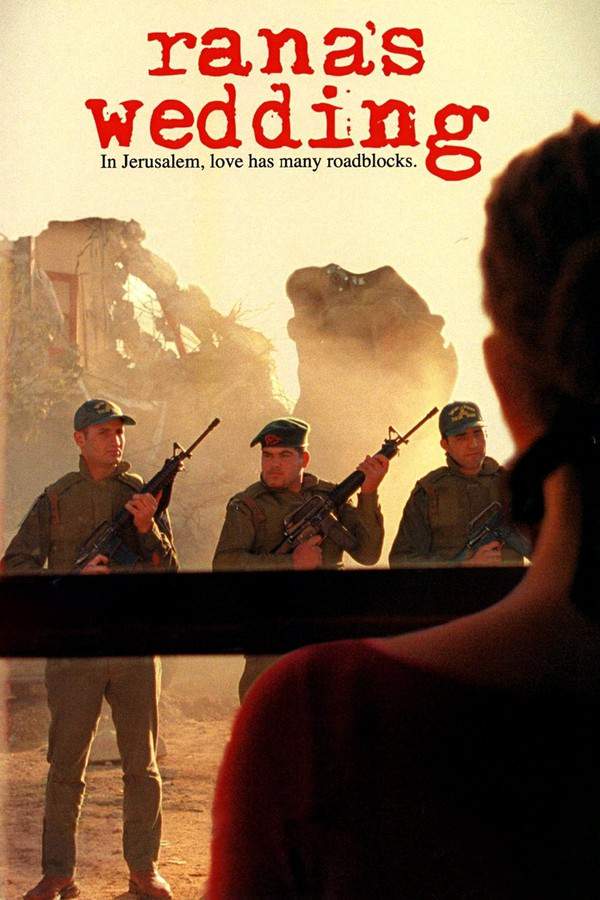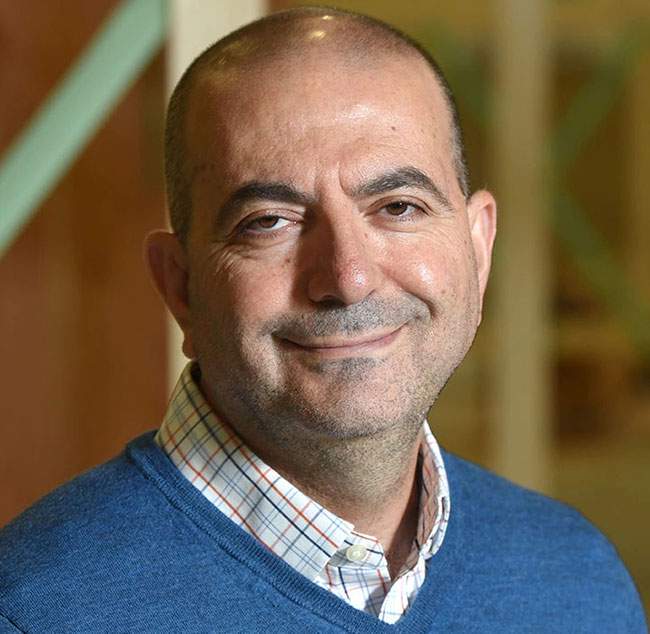
Rana's Wedding 2003
Directed by

Hany Abu-Assad
Made by

Arab Film Distribution
Test your knowledge of Rana's Wedding with our quiz!
Rana's Wedding Plot Summary
Read the complete plot summary and ending explained for Rana's Wedding (2003). From turning points to emotional moments, uncover what really happened and why it matters.
Rana, a 17-year-old girl residing in Palestine, finds her life turned upside down when her father makes a significant decision due to the chaotic living conditions. He chooses to relocate the family to Egypt to better support them financially. Upon waking one day, Rana discovers a letter from her father laying out two choices: she can either accompany him to Egypt and continue her education under his supervision or remain in Palestine and marry an approved suitor from a list he has provided. However, she has just 10 hours to decide before her father’s departure.
Initially taken aback by the limited options, Rana feels a wave of disappointment. Determined to make her own choice, she decides instead to flee her home in search of her beloved Khalil, who has not made her father’s list of acceptable partners. After an exhausting search, she finds him at a theater, where he is engaged in directing a play.
Rana urgently proposes marriage to Khalil, pushing for a prompt answer so they can wed prior to her father’s trip. With the help of a sheikh, they plan to drive to her father’s house to seek his consent. Much to her father’s surprise, he finds no justification under Islamic law to halt the marriage, ultimately relenting.
As the clock ticks down and Rana’s father prepares to leave for Egypt, tensions escalate with the sheikh still absent for the ceremony. Desperate to find him, Rana, Khalil, and her father embark on a journey to locate the sheikh, who is delayed due to a roadblock. In a moment of urgency, they exchange vows inside the car, culminating in a vibrant celebration on the streets of Jerusalem.
The film elegantly concludes with the poignant words of Palestinian poet Mahmoud Darwish: > “In every act of failure, there’s an act of love.”
Rana's Wedding Timeline
Follow the complete movie timeline of Rana's Wedding (2003) with every major event in chronological order. Great for understanding complex plots and story progression.
Rana's Father's Decision
Rana, a 17-year-old girl living in Palestine, faces a life-changing moment when her father decides to relocate the family to Egypt. This decision comes as a response to the chaotic living conditions that they endure, aimed at securing a better future for them.
The Letter
Upon waking up one morning, Rana discovers a letter from her father outlining two choices that will dictate her future. She can either move to Egypt and pursue her education, or stay in Palestine and marry a suitor from a list provided by him.
Rana's Dilemma
Initially shocked by her father's ultimatum, Rana grapples with feelings of disappointment and frustration. With only 10 hours to make her decision, she feels the weight of societal expectations pressing down on her.
The Decision to Flee
Refusing to be bound by her father's choices, Rana makes a bold decision to flee her home. Her heart is set on finding Khalil, her true love, who is notably absent from her father's approved list of suitors.
Searching for Khalil
Rana embarks on an exhausting quest to locate Khalil, navigating through the challenges posed by her surroundings. After a tumultuous search, she finally finds him at a theater, where he is actively involved in directing a play.
The Marriage Proposal
Without wasting any time, Rana urgently proposes marriage to Khalil, emphasizing the need for an immediate response. She desires to wed him before her father's impending departure, making her intentions crystal clear.
Seeking Consent
To proceed with their plans, Rana and Khalil enlist the help of a sheikh. With their hearts racing, they plan to drive to Rana's father to seek his consent for their marriage, hoping to convince him of their love.
Father's Surprise
Upon hearing their request, Rana's father is taken aback but listens intently. He finds that there is no foundation in Islamic law to prevent the marriage, thus yielding to their wishes, much to Rana's relief.
Time Running Out
As Rana's father prepares to leave for Egypt, tension mounts when the sheikh responsible for officiating the ceremony is delayed. The pressure intensifies as they try to figure out how to proceed without the sheikh's presence.
Vows in the Car
In a moment of desperation, Rana, Khalil, and her father decide to exchange vows inside their car. This spontaneous act transforms their initial plans into a reality as they commit to each other under immense pressure.
Celebration in the Streets
Following their impromptu wedding, a vibrant celebration erupts on the streets of Jerusalem. This public display of joy symbolizes their defiance against societal norms and the triumph of their love amidst adversity.
Poignant Conclusion
The film draws to a close with the heartfelt words of Palestinian poet Mahmoud Darwish, encapsulating the essence of the journey they undertook. It serves as a reminder that in every act of failure, love can emerge as a powerful force.
Rana's Wedding Characters
Explore all characters from Rana's Wedding (2003). Get detailed profiles with their roles, arcs, and key relationships explained.
Rana
Rana is a 17-year-old girl who embodies the struggles of young women in a demanding societal landscape. Faced with her father's ultimatum, she demonstrates resilience and determination to choose her own path, driven by her love for Khalil. Her character represents the clash between tradition and personal choice, revealing her strong will and desire for autonomy.
Khalil
Khalil is a passionate and devoted figure in Rana's life, representing her true love and the freedom to choose one's partner. His involvement in theater showcases his creative spirit and commitment to the arts. Khalil's willingness to marry Rana reflects his understanding of her needs and his desire to stand by her despite external pressures.
Rana's Father
Rana's father is a traditional figure who makes a significant decision to move the family for better financial prospects. He embodies the parental authority that often dictates choices regarding marriage and education. His eventual acceptance of Rana's marriage to Khalil signifies the challenges and eventual shift in perspective often faced by older generations.
Rana's Wedding Settings
Learn where and when Rana's Wedding (2003) takes place. Explore the film’s settings, era, and how they shape the narrative.
Time period
Modern Day
The events unfold in contemporary times, reflecting the societal and familial pressures faced by young women in the Middle East. The story showcases the challenges and limited choices available to Rana in a rapidly changing environment, especially regarding education and personal autonomy.
Location
Palestine, Egypt, Jerusalem
The movie takes place primarily in Palestine, where Rana grapples with family expectations and cultural norms. As her father decides to relocate the family to Egypt for better financial stability, the setting also shifts. The story culminates in a lively celebration in the streets of Jerusalem, highlighting the rich cultural tapestry of the region.
Rana's Wedding Themes
Discover the main themes in Rana's Wedding (2003). Analyze the deeper meanings, emotional layers, and social commentary behind the film.
💔
Love vs Duty
The theme of love versus duty is central to Rana's journey as she navigates her father's expectations against her desires. Faced with an ultimatum, she chooses to pursue her love for Khalil instead of adhering to traditional norms. This theme underscores the struggle for personal autonomy against deeply rooted societal pressures.
⏳
Time Pressure
Time plays a critical role in the narrative, with Rana given only 10 hours to make a life-altering decision. This countdown intensifies the drama and urgency of her actions, emphasizing the fleeting nature of opportunities and the need for decisive choices in critical moments.
🎭
Art and Expression
The inclusion of theater and poetry highlights the importance of art as a means of expression and connection. Khalil's involvement in directing a play reflects the power of creativity in navigating personal and cultural challenges, while the reference to Mahmoud Darwish emphasizes the richness of Palestinian literature.

Coming soon on iOS and Android
The Plot Explained Mobile App
From blockbusters to hidden gems — dive into movie stories anytime, anywhere. Save your favorites, discover plots faster, and never miss a twist again.
Sign up to be the first to know when we launch. Your email stays private — always.
Rana's Wedding Spoiler-Free Summary
Discover the spoiler-free summary of Rana's Wedding (2003). Get a concise overview without any spoilers.
In the ancient stones of Jerusalem, daily life hums with a mixture of reverence and restless uncertainty. The city’s winding alleys and looming checkpoints create a backdrop where family histories intersect with modern pressures, and every conversation carries the weight of tradition and the whisper of change. Against this textured landscape, the film adopts a lyrical, almost poetic tone, letting the city itself become a silent character that both confines and inspires.
(Rana) is a seventeen‑year‑old Palestinian girl on the cusp of adulthood, caught between the expectations of her close‑knit family and the stirring desire to chart her own destiny. When her father decides that the family must leave Jerusalem for Egypt in search of stability, he presents her with a stark ultimatum: accompany them and continue her studies under his watchful eye, or stay behind to marry a suitor from his approved list. The limited window of decision—just ten hours—imbues the narrative with an urgent, breath‑holding rhythm that mirrors the broader tension of a region where personal choices are often governed by communal and legal codes.
The story gently exposes the intricate layers of Islamic law, patriarchal traditions, and the everyday obstacles posed by military checkpoints, all of which shape the possibilities available to young women like Rana. Yet even as these forces loom, the film hints at a quietly rebellious spirit embodied in her secret affection for Khalil, a charismatic figure who exists outside her father’s prescribed options. Their connection suggests a yearning for freedom that transcends paperwork and precedent, offering a glimpse of love as both a personal refuge and a subtle act of resistance.
Through a blend of intimate performances and evocative scenery, the film invites viewers to contemplate the delicate balance between duty and desire, heritage and self‑determination. It leaves the audience with the lingering resonance of Mahmoud Darwish’s poetry, reminding us that every act of defiance is also an expression of love, and that the pursuit of one’s own path can be the most profound declaration of humanity.
Can’t find your movie? Request a summary here.
Featured on this page

What's After the Movie?
Not sure whether to stay after the credits? Find out!
Explore Our Movie Platform
New Movie Releases (2025)
Famous Movie Actors
Top Film Production Studios
Movie Plot Summaries & Endings
Major Movie Awards & Winners
Best Concert Films & Music Documentaries
Movie Collections and Curated Lists
© 2025 What's After the Movie. All rights reserved.





